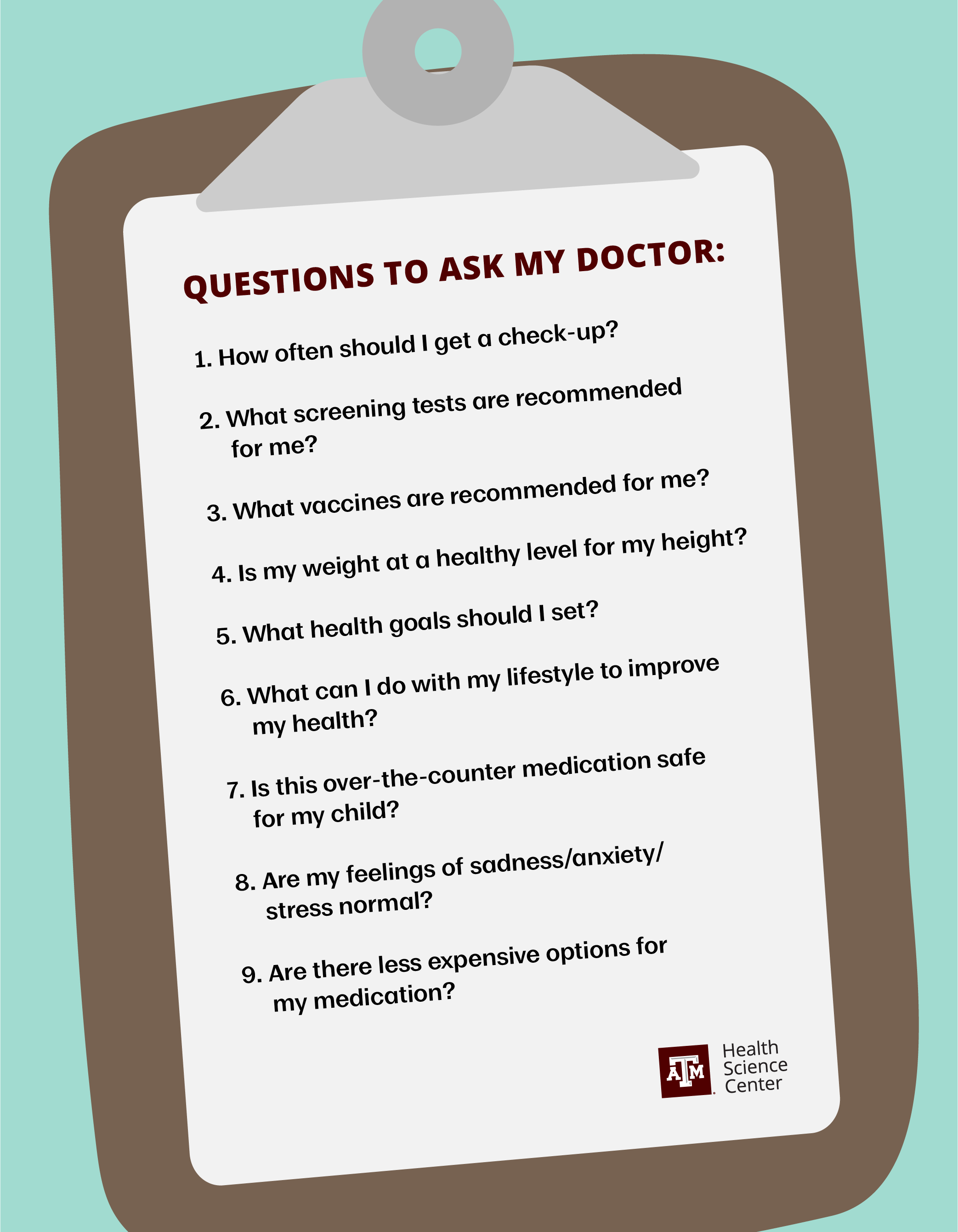- Mary Leigh Meyer
- Healthy Living, Medicine, Show on VR homepage, Trending
9 questions to ask your doctor
Asking your primary care provider the right questions can make you the best advocate for your health

Texas A&M University Health Science Center
From annual physicals to sick visits, most people end up in their primary care provider’s office at least once a year. As you sit in the waiting room, you may begin thinking about what questions you need to ask during your appointment. Charity Karpac, MD, adjunct assistant professor at the Texas A&M College of Medicine and primary care physician at the CHI St. Joseph and Texas A&M Health Network, suggests some questions to ask your health care provider to become a better advocate for your own health.
How often should I get a check-up?
If you are regularly a healthy person, the general rule of thumb is one check-up a year. However, depending on your age, lifestyle and health, the recommendation can vary. “If you are diagnosed with or are at high risk for a chronic disease like diabetes, it is especially important to ask your provider how many times per year you should be seen,” Karpac said. Similarly, she recommends you ask how often you need various tests for that chronic disease.
What screening tests are recommended for me?
Health care providers recommend different screening tests depending on your age, gender and family history. “Everyone should have a conversation with their primary care provider about their family history of cancers and diseases,” said Karpac. “The information they learn from that conversation will tell them if you are at a higher risk for certain health issues.”
Depending on your risk factors, your provider may suggest certain types of cancer screenings. They may also screen you for high blood pressure or cholesterol to determine your risk for heart disease or stroke.
What vaccines are recommended for me?
Sometimes vaccine recommendations change over time. For example, the United States Food and Drug Administration recently updated recommendations for the vaccine against the human papillomavirus, or HPV, for adults under 46 years of age.
“It is important for patients to ask preventive questions,” said Karpac. “Those questions often inspire discussions about topics that the primary care provider may not realize needs to be clarified with the patient.”
Is my weight at a healthy level for my height?
The height to weight ratio is a tricky concept to understand. Most providers use it as a metric to gauge whether a patient has a healthy weight level. “Often weight is the root of many problems—diabetes, high blood pressure, high cholesterol,” Karpac said. “If the provider and patient can work on achieving a healthier weight together, then it could improve a lot of other medical conditions and overall well-being.”
What health goals should I set?
For specific diseases or illness, Karpac recommends you ask about goals to help manage your health. Your primary care provider can suggest you work toward seeing a certain number on the scale or a range of blood sugar levels. People often find improving their health can be easier if the task is broken down into actionable goals to accomplish.
What can I do with my lifestyle to improve my health?
“A lot of health issues can be improved through simple lifestyle changes,” said Karpac. A great question to ask your primary care provider is about tips on how to adjust your lifestyle to improve your health. Parents can also ask the same question about tips on how to encourage their children to change their lifestyle.
Is this over-the-counter medication safe for my child?
“Some medications, even though they are sold over-the-counter, can be harmful to younger children,” said Karpac. “If you are unsure, please ask your primary care provider, pediatrician or pharmacist.” If the medication is safe for your child, parents should be sure to pay close attention to the dosage instructions.
Are my feelings of sadness/anxiety/stress normal?
People should ask about their mental health, even if they do not believe something is wrong. “It is very important to be open and honest with your primary care provider about how you have been feeling,” said Karpac. “Often people do not know what is normal and what is not with regard to their mental health.”
Are there less expensive options for my medication?
Health care providers may not know what a prescription is going to cost due to variances in insurance coverages. “If you get to your pharmacy and realize the prescription is entirely too expensive, do not be afraid to call your provider back and ask for other options,” Karpac advised. Another option is to search for medication assistance programs like Texas A&M Healthy South Texas’ Medication Assistance Program. Programs like that help patients get their prescription medications for free or almost free.
Patients and their primary care providers work as a team to improve the patient’s health. If you are confused or are curious about something, your primary care provider is there to talk with you. You should never feel afraid to ask them a question.

Media contact: media@tamu.edu


